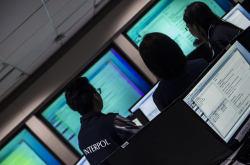SINGAPORE – In response to the rapidly changing cybercrime landscape during the COVID-19 pandemic, the global law enforcement and cybersecurity communities have formed an alliance to protect the public.
Harnessing the expertise of this alliance, INTERPOL has launched a global awareness campaign to keep communities safe from cybercriminals seeking to exploit the outbreak to steal data, commit online fraud or simply disrupt the virtual world.
The key message of the campaign, which focuses on alerting the public to the key cyberthreats linked to the coronavirus pandemic, is to #WashYourCyberHands to promote good cyber hygiene.
The campaign will focus on social media outreach, highlighting the top threats that INTERPOL has identified based on the data collected from its member countries, private industry partners, national cybersecurity agencies and online information-sharing groups.
Analysis of this data has confirmed that cybercriminals are capitalizing on the anxiety caused by COVID-19 through various cyberattacks such as data-harvesting malware, ransomware, online scams and phishing.
Threats targeting people working from home during the global lockdowns will also be addressed, along with prevention tips for companies.
Basic cyber hygiene advice – how to ‘wash your cyber hands’ – will be provided throughout the four-week (4 – 31 May) campaign, to ensure that individuals and businesses are equipped with the knowledge of how to protect their systems and data.
Law enforcement agencies around the world and key global cybersecurity actors will share the messages of the campaign to reach the widest possible global audience.
Craig Jones, INTERPOL’s Director of Cybercrime, said police and the cybersecurity industry have seen a considerable increase in the number of targeted cyberattacks by criminals since the virus outbreak began. These range from malicious web domains using the word ‘covid’ to phishing emails promising the sale of key supplies as well as ransomware attacks against critical infrastructure and hospitals.
“Cybercriminals are diversifying attack vectors to launch cyberattacks exploiting the COVID-19 outbreak. These cyberthreats are causing serious harm to people and organizations, which exacerbate an already dire situation in the physical world. Now is the time when we all must come together to stop them,” said Mr Jones.
“Cybercrime and cybersecurity may seem like a complex issue that is difficult to understand unless you are an expert in the field – this is not the case. INTERPOL’s campaign aims to demystify these cyberthreats and offer simple, concrete steps which everybody can take to protect themselves,” he concluded.
The campaign kicked off with the publication of a document on the ‘Global landscape on the COVID-19 cyberthreats’ which outlines the latest threats identified, expected future trends and INTERPOL’s response.
See also
Related news

260 suspected scammers arrested in pan-African cybercrime operation
26 September 2025
Disrupting a Grandoreiro malware operation
18 March 2024






